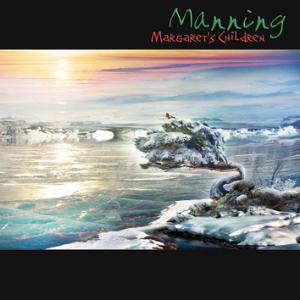Is it possible to release on an annual basis an album that contains enough musical quality to entertain devotees of progressive rock? Well, Guy Manning proves that it is. He's a British singer-songwriter and a multi-instrumentalist who made some name in bands like Parallel Or 90 Degrees and The Tangent. In 1999 he released his first solo album Tall Stories For Small Children. Since then he released a solo album or an album with his band Manning each year. I listened to most of these twelve albums and I think they all are of a high level! In 2006 Manning released Anser's Tree. On this album he tells several stories about imaginary people including the opening track about one Margaret Montgomery. This character was the inspiration for a sequel to the Anser's Tree album. This time Manning used Margaret's children to create another album consisting of fantasy stories. Therefore he called Anser's Tree, part II Margaret's Children. Seven imaginary people formed the inspiration for writing seven strong progressive rock tunes. When you're interested in the connection between both albums and the stories behind those characters you must certainly read the interview (see interview) I had with Guy Manning. It leaves me more room to tell a bit more about the music on this release. On Margaret's Children Guy Manning plays acoustic six and twelve string guitar, classical guitar, electric guitar, keyboards, bass, bouzouki, mandolin, percussion and drums. In addition he does the lead and backing vocals. However, he didn't create the album completely on his own; otherwise he wouldn't have called it an album by Manning. The other musicians who assisted him on Margaret's Children are of course his fellow band members Chris Catling (electric guitars, backing vocals), Kev Currie (electric guitars, guitar synthesizer, backing vocals), Steve Dundon (flute), Kris Hudson-Lee (basses), Julie King (backing vocals, lead vocal on Harriet Horden), Tim Leadbeater (grand piano on tracks 4 and 7 and electric piano solo on track 1). Beside his own band he asked a number of guest musicians to contribute like Ian 'Walter' Fairbairn (fiddle), Kathy Hampson (cello), John Kennard (backing vocals, darbuka, drums program consultancy), Mark Woodward (additional violin), Marek Arnold (Toxic Smile, clarinet, saxophones), Leon Camfield (Tinyfish, percussion) and Phideaux as 'The MC at the Savoy'. Music wise the album is a bit more singer-songwriter orientated than for instance an album like Charlestown (see review). This time less guitar and keyboard solos were included, something that I personally regret because I think that fine solos and instrumental passages are part of the progressive rock tradition. However, they're still present on a couple of tracks. Good examples are the strong synthesizer solos on Amy Quartermaine (1862-1916) and Amelia Fairfax (1926-2010) and you can enjoy a fine guitar solo on the final piece David Logan (1967-2022). People who fancy the old sound of a Mellotron also make a right choice with this album. It's probably not a real tron Manning used, but it's still worth listening to it anyway. Every now and then, the use of real violins and cellos give the songs a dramatic flavour which I like a lot. It's obvious that Guy Manning tried to provide all songs with the right atmosphere that fits the story. A fine example is the Arabic influence on Amelia Fairfax. The saxophones really give you the impression that you're in Cairo. It's difficult to pick out any favourites because all songs are high-leveled. However, I guess that the final piece David Logan gets the nomination of being the absolute highlight mainly because of the beautiful orchestral parts and the outstanding climax. During this climax a fabulous guitar solo can be enjoyed which could have been done by Bryan Josh (Mostly Autumn). I know Mr. Manning doesn't like to be compared to other progressive rock bands or artists, but sometimes it's necessary to compare just to give the readers something to go by or to give an idea how an album sounds like. It's hard to avoid names as Ian Anderson or Jethro Tull, when your voice resembles Mr. Anderson's and you playing the flute. Sure, other influences from Yes, Pink Floyd or Genesis are perceptible as well, but they don't come to the surface that often. Anyway, Guy Manning released with his eponymous band another fine progressive rock album. **** Henri Strik (edited by Peter Willemsen) Where to buy? |
